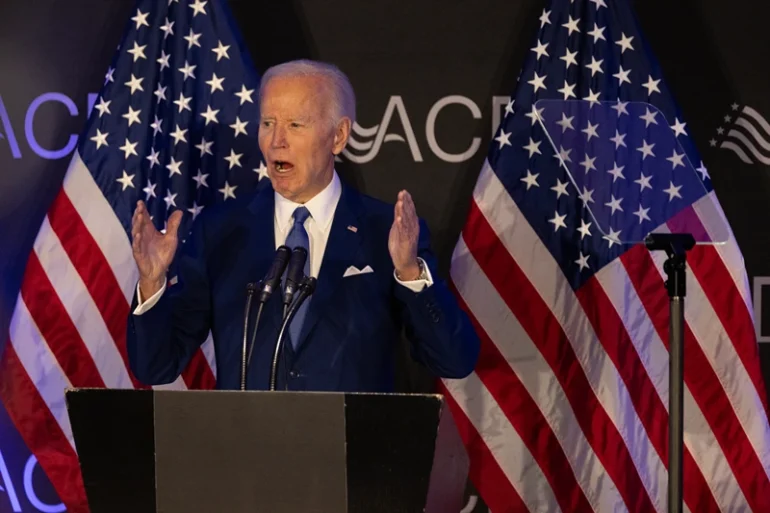On April 15, 2025, former President Joe Biden stepped back into the public eye with a speech at the Advocates, Counselors, and Representatives for the Disabled (ACRD) conference in Chicago. The event, focused on defending Social Security and disability services, was meant to be a platform for Biden to critique the current administration’s policies. However, his use of the term “colored kids” while recounting a childhood memory stole the spotlight, sparking widespread criticism and reigniting debates about race, language, and political accountability.
A Misstep in the Spotlight
Biden’s speech began with a personal anecdote about moving from Scranton, Pennsylvania, to Wilmington, Delaware, as a fourth-grader. Reflecting on his first encounters with segregation, he recalled seeing Black children, whom he referred to as “colored kids,” on a bus that didn’t turn toward the local high school. “They never turned right to go to Claymont High School,” Biden said, explaining how learning Black students were barred from attending public schools with White students fueled his sense of outrage.
While Biden intended to highlight his early awareness of racial injustice, the phrase “colored kids” struck a nerve. The term, once common during the segregation era, is now widely considered offensive, tied to a history of racial discrimination. Social media erupted, with critics pointing out the insensitivity of the language. One user on X wrote, “Imagine if President Trump referred to Black kids as ‘colored kids.’ The liberals would be fake outraged and they wouldn’t shut up for days. So, who’s the actual racist?” The backlash wasn’t limited to conservatives; even some liberal voices expressed discomfort, noting that the remark underscored Biden’s occasional tone-deafness on racial issues.
President Donald Trump didn’t directly comment but reposted a clip of Biden’s statement on Truth Social, letting the moment speak for itself. The White House, through press secretary Karoline Leavitt, took a jab at Biden’s return to public life, mocking his “nighttime” speech and announcing a new policy to prevent illegal immigrants from accessing Social Security benefits, seemingly to overshadow Biden’s event.
Social Security Takes Center Stage
Beyond the controversy, Biden’s speech focused heavily on Social Security, which he called a “sacred promise” to America’s elderly and disabled. He accused the Trump administration and Special Government Employee Elon Musk of undermining the program through workforce cuts and office closures. “In fewer than 100 days, this new administration has made so much damage and so much destruction,” Biden said, alleging that Republicans aim to “wreck it so they could rob it” to fund tax cuts for the wealthy.
Biden’s fiery rhetoric included a jab at “300-year-old folk” receiving benefits, a lighthearted quip about his own age that drew chuckles but also highlighted his familiar, sometimes meandering style. He claimed that Trump’s policies, like reducing 7,000 Social Security Administration staffers, were causing “needless pain and sleepless nights” for vulnerable Americans.
The Trump administration pushed back hard. The official Social Security X account labeled Biden’s claims as lies, insisting that no field offices had closed and that Trump had pledged to protect benefits. Conservatives argue that the cuts target bureaucratic waste, not essential services, and ensure taxpayer funds aren’t misused through measures like stricter identity verification.
A Polarized Response
The ACRD conference, where Biden received the “Beacon of Hope” award, was billed as his first major public address since leaving office on January 20, 2025. However, he’s made quieter appearances, like at a model United Nations event and a St. Patrick’s Day brunch, suggesting a gradual return to public life. Still, many Democrats blame Biden for lingering too long in the 2024 race, paving the way for Trump’s second term. One longtime supporter, when asked by CNN if they’d heard from Biden since January, replied, “No. Thank God.”
Biden’s speech encapsulated his trademark style: passionate, personal, and occasionally unpolished. His defenders argue that the “colored kids” remark, while clumsy, reflected the language of his youth and was part of a broader point about fighting injustice. Critics, however, see it as a reminder of why his presidency ended—out of touch and prone to gaffes.
Looking Ahead
The controversy over Biden’s words and his critique of Trump’s Social Security policies highlight the deep divides in American politics. As Biden reenters the public stage, his every word will be scrutinized, especially on issues as sensitive as race and economic security. For now, the debate rages on: Was Biden’s remark a forgivable slip or a revealing misstep? And will his warnings about Social Security resonate in a polarized nation?
